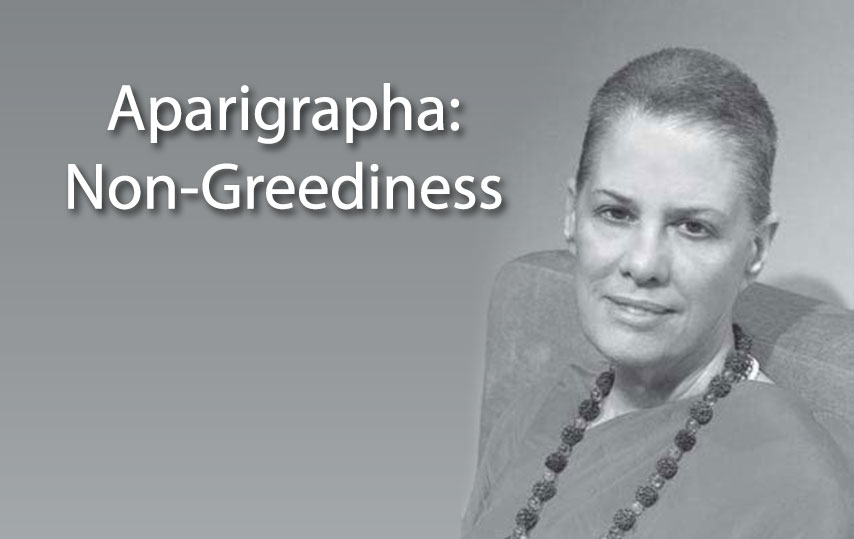Aparigraha is the fifth of the five Yamas, things that other people do in their lives but yogis abstain from. This makes Aparigraha the most challenging so far, with your study and practice of the preceding ones being preparation for this new level of self-transformation. Patanjali promises results from this practice:
Aparigraha-sthairye janma-kathamtaa-sambodhah. Yoga Sutras 2.39
Becoming established in non-greediness gives you knowledge of the how and why of birth (your own, others’, and the world’s).
Let’s turn the statement around to see what it means: greed keeps you from knowing the purpose of your life. Becoming free from greed will open up an inner knowing of your life’s purpose. This promise pivots on the Sanskrit word “graha” which is embedded in the term Aparigraha. Graha means grasping, like when your fingers grab the edges of a really wide jar lid. You grab on and hold tight, so you can open it up and access the contents. The grabbing on and holding tight is graha.
When you are practising Aparigraha, you stop to consider if you really need what is in the jar, or is greed driving you to pursue the delights of your senses once again. The reason you must practise non-greediness is because, every time you pursue something on the outside, you get farther away from your own divine essence. When does it become time to stop, turn around, and look to see who you really are?
You might think that greed is classified as a vice, but the Western world actually promotes, supports and rewards greed. Examples abound:
The many ads incite you into wanting more, but when you buy it all, how do you ?t it into your already full home? Thus it overflows into the garage, attic, basement and storage sheds.
Are you making enough money? You’re supposed to be on an upward trajectory, making ever greater sums, even for the same work, for the rest of your working life. Some people work two or three jobs so they can have enough money to gratify their needs
Restaurants serve larger portions than anyone can eat, and then follow with lavish and tempting desserts. In addition, as is now well known, some of the most widely-consumed fast food items provide enough calories in one sandwich to sustain your body for an entire day.
How many pairs of shoes do you own? Or guitars? In a recently published interview, a professional musician disclosed that he owns over 200 guitars.
I opened a kitchen drawer a few days ago and found six screwdrivers in it. The toolbox, which has another ten screwdrivers, is in the garage. Quite a few are duplicates.
Where do you draw the line? It is an intensely personal answer, perfect for a process that asks you to look at who you are. Yoga says, “Who are you, inside your own skin?” One way of describing yourself is by describing your desires. You tell everyone around you about all your desires, so now take a few moments to listen to yourself. What do you want, and how much of it do you need? You are describing where you put your time and energy. You are describing what you are becoming. You create your future, even unto lifetimes! What do you want, and how much of it do you need?
No matter what your answer is, I guarantee it will be different after a Yoga class. The difference is because of how you feel inside your own skin. After doing Yoga, you feel more whole. You feel more complete within yourself. You feel less needy, therefore you desire fewer things.
Looking at your relationship with food is a great place to begin exploring when you cross over the dotted line between need and greed. I would challenge you to a scienti?c experiment. One day, eat your midday or evening meal without having done any Yoga beforehand. The next day, do a short Yoga session (breathing, poses, meditation or chanting), ending it 30-60 minutes before your meal. You will discern many differences, including:
The quantity of food you eat
The type of food you choose
The pace at which you eat your food The difference in the feeling of hunger
The difference in your feeling of satiation or fullness
Yoga makes you able to approach your life, not simply your food but your whole life, from a place of inner fullness. When you base yourself in your own divine essence, your decisions change. Your experience of life changes. Yoga makes you able to base your life on a sense of inner fullness, not on neediness, which is where most people begin their day.
There are two ways of approaching this Yama:
1) Stop being greedy, which will quiet your mind and give you access to your own divine essence,
2) Do more yoga, which makes you less greedy.
Both of these approaches are valid. Both are needed, because sometimes you cannot do enough of Yoga practices to maintain your inner wholeness, which means you must then restrain yourself from indulging that needy-greedy re?ex of grasping at everything within reach.
In addition to these two ways of approaching Aparigraha, you have the third possibility: you’ve been doing more Yoga, which has made you less greedy, but you didn’t realise what was happening. Now you don’t want the things you used to want. Those closest to you don’t understand you and you don’t understand yourself either. Are you losing your edge? Maybe the inner drive that kept you running at top speed is not driving you anymore. Someone moved your cheese.
The sages caution again and again that you cannot take all those worldly belongings with you. My Guru used to tell a story of a king who arranged for his coffin to be carried through the streets after his death, with his hands protruding out the sides to show everyone that he was taking nothing with him. Aparigraha allows you to reduce your acquisitiveness, so you have time, money and energy to apply to something of greater use than all the possessions you haven’t yet acquired. Now it is time to discover what you already have – your own Self.
Aparigraha is a Yoga practice that prompts you to ask and answer the question: how much do you really need? It gives you the ability to discern between need and greed. I’ll offer you a tip: the answer is found in fear and freedom from fear. Need and greed arise from fear. Yoga gives you freedom from fear. Do more Yoga.


















 Other
Other